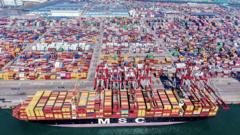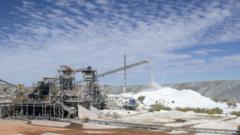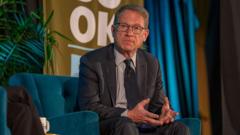**As the trade war escalates, the Chinese government emphasizes the need for tariff reductions to foster negotiations and avert further economic strife**
**China Pressures Trump: Cancel Tariffs for Trade Talks to Proceed**

**China Pressures Trump: Cancel Tariffs for Trade Talks to Proceed**
**China insists that the removal of tariffs is essential for genuine trade discussions with the U.S**
China has urged President Donald Trump to lift extensive tariffs on its goods if he is genuinely interested in resolving the ongoing trade conflict between the U.S. and China. This call comes amidst escalating tensions, as a Chinese official indicated that despite claims from the Trump administration, no trade discussions are currently happening.
The trade war between the two economic giants has intensified, manifesting in retaliatory measures that include China returning Boeing aircraft ordered from the U.S. In this regard, Trump has shown signs of a more conciliatory approach, suggesting that the tariffs on Chinese imports—currently reaching as high as 145%—could decrease significantly, albeit not be eliminated entirely.
Commerce Ministry spokesperson He Yadong emphasized that all "unilateral tariff measures" must be revoked for any authentic dialogue to occur. He metaphorically noted that the individual who initiated the imposition of tariffs ought to be the one to remove them. Furthermore, Guo Jiakun, a spokesperson for China's Foreign Ministry, refuted the notion of any negotiations being underway, countering Trump's assertions of active discussions.
While Treasury Secretary Scott Bessent echoed the sentiment that the possibility of a major trade agreement exists, he commented that meaningful negotiations have yet to commence. Trump recently expressed a desire for warmer negotiations with Beijing, signaling his intent to forge a trade deal.
Contrarily, following China's stern remarks, Trump resorted to his social media platform, stating that Boeing should hold China accountable for its failure to accept the planes it had ordered. He reiterated his long-standing grievances against China, including accusations regarding the influx of fentanyl into the U.S.
In conjunction with these developments, Boeing's CEO disclosed that several aircraft had been returned by China as a form of retaliation in response to the imposed tariffs. Meanwhile, China convened a meeting aimed at addressing the concerns of over 80 foreign companies affected by the U.S. tariffs, suggesting a proactive stance in converting challenges into business opportunities, according to Vice Commerce Minister Ling Ji.
The trade war between the two economic giants has intensified, manifesting in retaliatory measures that include China returning Boeing aircraft ordered from the U.S. In this regard, Trump has shown signs of a more conciliatory approach, suggesting that the tariffs on Chinese imports—currently reaching as high as 145%—could decrease significantly, albeit not be eliminated entirely.
Commerce Ministry spokesperson He Yadong emphasized that all "unilateral tariff measures" must be revoked for any authentic dialogue to occur. He metaphorically noted that the individual who initiated the imposition of tariffs ought to be the one to remove them. Furthermore, Guo Jiakun, a spokesperson for China's Foreign Ministry, refuted the notion of any negotiations being underway, countering Trump's assertions of active discussions.
While Treasury Secretary Scott Bessent echoed the sentiment that the possibility of a major trade agreement exists, he commented that meaningful negotiations have yet to commence. Trump recently expressed a desire for warmer negotiations with Beijing, signaling his intent to forge a trade deal.
Contrarily, following China's stern remarks, Trump resorted to his social media platform, stating that Boeing should hold China accountable for its failure to accept the planes it had ordered. He reiterated his long-standing grievances against China, including accusations regarding the influx of fentanyl into the U.S.
In conjunction with these developments, Boeing's CEO disclosed that several aircraft had been returned by China as a form of retaliation in response to the imposed tariffs. Meanwhile, China convened a meeting aimed at addressing the concerns of over 80 foreign companies affected by the U.S. tariffs, suggesting a proactive stance in converting challenges into business opportunities, according to Vice Commerce Minister Ling Ji.



















